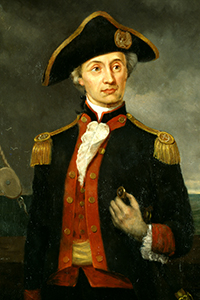John Paul Jones
The “American way of war” may have been, since the days of Gen. Ulysses Grant, to overwhelm the enemy with superior firepower. But the American military has also, from its earliest days, prized resourcefulness and daring against great odds. John Paul Jones embodies the latter tradition. In the Revolutionary War, the fledgling, tiny Continental Navy was no match for Great Britain’s Royal Navy, which ruled the seas with a hundred massive ships of the line. The American rebels had a few frigates and sloops. For most of the war, the Continental Navy remained blockaded in port.
Not John Paul Jones. He understood that the battle must be carried into the enemy’s home waters. First aboard the sloop Providence, he raided British fishing grounds in Nova Scotia, then took his newly built sloop Ranger into British waters, raiding the port of Whitehaven and then sailing to his native Scotland in an unsuccessful attempt to kidnap the Earl of Selkirk. (Jones’ men appropriated the Earl’s silver, which Jones, who saw himself as an officer and a gentleman, later returned.) They defeated HMS Drake in a rousing single-ship action and made off with dozens of warships in hot pursuit. No naval force had attacked British soil in over a century.
Jones’ great moment of glory came a year later, on Sept. 23, 1779, when he took the frigate Bonhomme Richard into battle against a superior British warship, HMS Serapis. “I wish to have no connection with any ship that does not sail fast, for I intend to go in harm’s way,” Jones famously wrote, but it is an irony of history that he sailed into his most critical battle in an old, slow tub.
Still, he grappled with the enemy, and when the British captain asked him if was ready to surrender, Jones is said to have replied, with words that have gone down through the ages, “I have not yet begun to fight!” About two hours later, after losing half his men in intense fighting, the British captain struck his colors.
Jones’ triumph over a better armed, better trained British man of war shocked the British people. Embarrassed, their government tried to make the most of the defeat by granting the captain a knighthood for putting up a brave fight against the “pirate Jones.” Jones, who had a sense of humor, was amused by his foe’s effort to salvage some honor. When he heard that Captain Pearson was now “Sir Richard,” Jones slyly remarked, “Were I only able to make him a Lord someday.”
Jones has been called “the father of the American Navy,” and he lies in a tomb at the U.S. Naval Academy. He gave the Navy its age-old spirit: indomitable and bold.
– Evan Thomas, author of “John Paul Jones: Sailor, Hero, Father of the American Navy”

